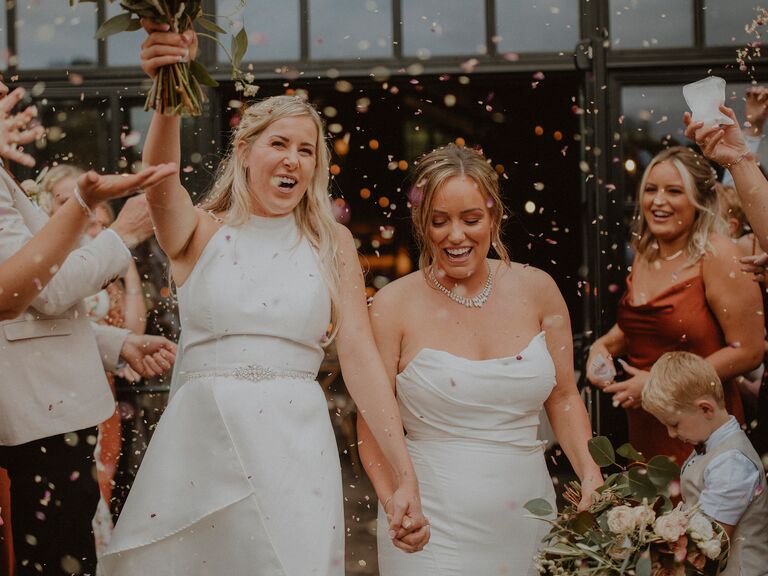An LGBTQIA+ Couple's Guide to Name Changes After Marriage

Congratulations on marrying your best friend! No doubt you're taking a breather after sorting out countless wedding details, but there's one more item to check off your list: deciding whether to change your last name (and figuring out how to do so). LGBTQIA+ marriage name change protocol varies from state to state just as it does for heterosexual marriages, but no matter where you live it's a pretty straightforward process.
Ahead, we're covering need-to-know details on changing your name after marriage—including who takes whose last name and additional name-change options to consider.
In this article:
- How to Tackle an LGBTQIA+ Marriage Name Change
- Should You Change Your Last Name After Marriage?
- Who Changes Their Name in an LGBTQIA+ Marriage?
- LGBTQIA+ Marriage Name Change Options
How to Tackle an LGBTQIA+ Marriage Name Change
Completing an LGBTQIA+ marriage name change is the same process as a heterosexual marriage. In either case, every state has its own protocol so it's important to research your state's specific rules, says Martha Cohen Stine, a New York attorney at Cohen, Stine, Kapoor.
"Typically, you will be indicating the name you wish to use in your marriage certificate and the change will take effect upon your marriage," she says. "It's the follow-up—updating your name on your official identification documents—that is more complicated and time-consuming."
She says to prepare yourself for lots of forms to complete and governmental agencies to visit as you arrange to update your name on your social security card, driver's license, passport, voter registration and other documents.
"Governmental name change forms typically require the presentation of further documentation, such as your marriage certificate, birth certificate, driver's license, passport, proof of address and more," says Cohen Stine. "Services like HitchSwitch and NewlyNamed offer name change assistance for a fee and streamline the process by providing you with step-by-step instructions and the forms and applications that you will need."
Do note that some cases of marriage name changes require a separate hearing, an application process and/or a court order in addition to your marriage license. For example, not all states allow for men to change their last name without a standard statutory name change proceeding. (This is true whether in a heterosexual or an LGBTQIA+ marriage.)
For more details, we've created a robust guide on how to change your last name after marriage, including which documents you'll need to update after the change and how to change your name by state.
Should You Change Your Last Name After Marriage?
Choosing whether to change your last name in an LGBTQIA+ (or straight) marriage is completely up to you. For some, sharing a last name with their partner is deeply important and can make certain situations—like medical visits or having children—easier. It's also considered a way to seize the relatively new freedom of getting married to an LGBTQIA+ partner.
"Society has a powerful interest in recognizing and supporting the institution of marriage. Spouses sharing the same last name has been a societal norm for centuries and is still common today," Cohen Stine explains. "However, given that the right to marry was such a long and hard-won victory for the gay rights movement, sharing the same last name may be desirable for LGBTQIA+ couples as it announces their marital status to the world."
That said, some couples in the queer community choose not to change their name for extremely valid reasons. This practice is historically rooted in the patriarchy and may be viewed as old-fashioned. There are also career implications to consider and, in some cases, both parties may just love their last names and want to keep them. Whatever you decide is your right!
Who Changes Their Name in an LGBTQIA+ Marriage?
A common question people have about LGBTQIA+ marriages is who gets to keep their last name and who changes theirs. The truth is that there's no right or wrong answer—every couple is different and can make the choice that suits them best.
"Whether you are LGBTQIA+ or heterosexual, taking your spouse's name is a personal choice and there is no right way or wrong way to proceed," Cohen Stine says. Our best advice is to talk about it with your partner to make a decision you both feel comfortable moving forward with.
LGBTQIA+ Marriage Name Change Options
You've got a few different options when it comes to changing your last name after marriage. Again, every couple's desires are different, and there's no right or wrong choice. What works for you is the best path forward. Here are some additional options to consider.
- Neither Changes Their Name: Both parties can keep their last name and remain legally married. Neither is obligated to change their last name if they do not want to.
- Hyphenated Last Names: A hyphenated surname is popular because it shows unionship, allows you to share your name with your spouse and is convenient if you choose to have children.
- Newly Created Last Name: You and your partner can choose a new surname to share together. This option is rising in popularity, but Cohen Stine notes that it's probably the most complicated option. "This type of name change would likely require the filing of a petition in court and a court order," she says. It may also involve a background check and court hearing.























